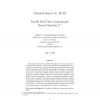Free Online Productivity Tools
i2Speak
i2Symbol
i2OCR
iTex2Img
iWeb2Print
iWeb2Shot
i2Type
iPdf2Split
iPdf2Merge
i2Bopomofo
i2Arabic
i2Style
i2Image
i2PDF
iLatex2Rtf
Sci2ools
PDPTA
2000
2000
Parallel Real-Time Cryptography: Beyond Speedup II
The primary purpose of parallel computation is the fast execution of computational tasks that are too slow to perform sequentially. However, it was shown recently that a second equally important motivation for using parallel computers exists: Within the paradigm of real-time computation, some classes of problems have the property that a solution to a problem in the class computed in parallel is better than the one obtained on a sequential computer. What constitutes a better solution depends on the problem under consideration. Thus, for optimization problems, `better' means `closer to optimal'. The present paper continues this line of inquiry by exploring another class enjoying the aforementioned property, namely, cryptographic problems in a real-time setting. In this class, `better' means `more secure'. A real-time cryptographic problem is presented for which the parallel solution is signi cantly better than a sequential one. Key words and phrases: Parallelism, rea...
| Added | 01 Nov 2010 |
| Updated | 01 Nov 2010 |
| Type | Conference |
| Year | 2000 |
| Where | PDPTA |
| Authors | Selim G. Akl, Stefan D. Bruda |
Comments (0)

